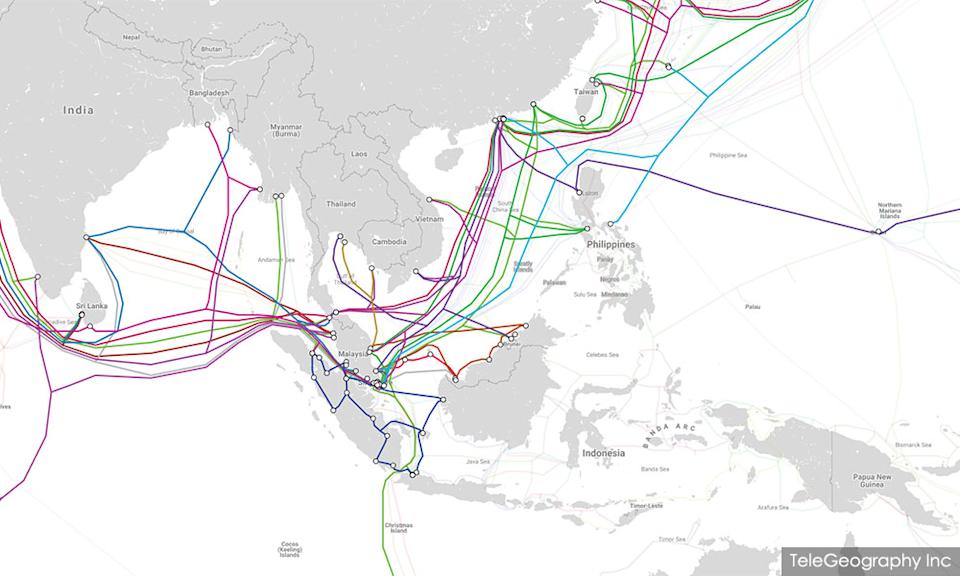Tech giants turn to Muhyiddin after Wee's 'abrupt' move

Tech giants, including Microsoft, Google and Facebook, have turned to Prime Minister Muhyiddin Yassin for intervention over a decision by Transport Minister Wee Ka Siong, which they say will hamper Malaysia's internet infrastructure.
Wee, had on Nov 13, signed a federal gazette revoking the cabotage exemption to foreign ships involved in the repair of submarine cables, which connects Malaysia to the global internet network.
The exemption helped speed up repairs of submarine cables that are damaged from time to time, causing internet disruption in the country.
Microsoft, Google, Facebook and Malaysia Internet Exchange (MyIX), in a memorandum to Muhyiddin dated Nov 20, said Wee's decision would have adverse impact on Malaysia's economy.
According to the accompanying letter sighted by Malaysiakini, the tech giants cautioned that Wee's decision will result in increased repair times for submarine cables, thereby hurting Malaysia's internet stability.
"At a time when millions of Malaysians are dependent on the internet for their livelihoods, the restoration of submarine Internet infrastructure representing investments of billions of ringgit is being unnecessarily delayed every time a repair needs to be carried out," it said.

Describing Wee's decision as "abrupt", they expressed serious concerns that there was no meaningful stakeholder consultation with foreign investors and owners of submarine cables.
"It does not project regulatory stability or a policy environment that is conducive to foreign investment," the tech giants said.
Creation of a monopoly
They added that the decision would create a monopoly for only one local shipping company, which only has one cable laying vessel in Malaysia.
The revocation took effect on Nov 15 and a day later, the Malaysia Shipowners' Association (Masa) wrote to Wee praising his decision, which its chairperson Abdul Hak Md Amin described as "patriotic" and puts "Malaysia first".
Posted by Malaysia Shipowners' Association (MASA) on Monday, 16 November 2020
Abdul Hak also highlighted that its member, Optic Marine Group, is in the midst of registering a Malaysian-flagged cable laying vessel and is optimistic that Malaysian-flagged vessels can contribute to the nation.
Optic Marine Group describes itself as a solution provider for subsea cable installation and maintenance projects.
The group's executive chairperson is Lim Soon Foo, whose family controls the privately-owned business. His son Ronnie Lim Hai Liang serves as the group executive chief officer.
The end of the cabotage exemption means foreign vessels that intend to participate in the repair of submarine cables in Malaysia must once again apply for domestic shipping licensing exemption (DSLE).
The tech stakeholders, in their memorandum, noted that foreign vessels that want to secure the DSLE must first be endorsed by Masa - the same association that has sung praise over Wee's decision.
They pointed out under the DSLE regime, repair times for submarine cables have been among the longest in the region.
They said the average submarine cable repair time in Malaysia is 27 days, compared to 20 days in the Phillippines, 19 days in Singapore and 12 days in Vietnam.

"This makes Malaysia less favourable than Singapore for submarine cables to land, despite the shorter distance compared to Singapore.
"In short, the cabotage law has not had a positive impact on investment and neither has it supported Malaysia’s aspiration as a hub for communications and multimedia, but instead has had a negative impact on repair," they added.
They projected that under the cabotage exemption, the average repair time would be 14 days, almost half of the time needed under the DSLE regime.
The memorandum also noted that Malaysia is aspiring to attract more global data centres to the country, but said the cabotage exemption revocation would make Malaysia a less attractive destination for investment.
The tech stakeholders used the example of Facebook to highlight the impact such investments can have, pointing out that Facebook had invested US$11.5 billion in data centres and contributed US$18.6 billion in gross domestic product to the US economy.
Urgent intervention sought
They concluded the memorandum by appealing for "urgent intervention" from the prime minister.

The tech stakeholders also copied the letter to 11 other ministers. Wee was not one of them.
They argued that Wee's decision would affect the other ministries as many of their initiatives also depend on quality internet, from e-commerce to foreign investment and from finance to cybersecurity.
The revocation of the cabotage exemption was not well publicised and only came to light after former transport minister Anthony Loke highlighted the issue in the Dewan Rakyat on Nov 17.
The Seremban MP, who during the previous Pakatan Harapan government approved the exemption, questioned the hushed manner in which the revocation was done and whether the stakeholders were consulted.
Less than a month before the revocation, Malaysia Internet Exchange (MyIX) chairperson Chiew Kok Hin had even praised Transport Ministry officials for successfully pushing through the exemption which he said was critical in ensuring the country's internet infrastructure is not interrupted.
"The Transport Ministry's ongoing commitment is very reassuring for foreign players investing in our country’s internet backbone, and this includes subsea cables,” Chiew was quoted as saying by tech portal Digital News Asia.
"More international connectivity and a robust domestic backbone would continue to attract sizeable investments into Malaysia," he added.


